Hungarian actress Maria Corda played Helen of Troy in the American silent film The Private Life of Helen of Troy (1927) with Ricardo Cortez as Paris. Husband Alexander Korda directed them, parodying the plot-line of historical epics of the era by transforming the classical characters into everyday people with modern problems.
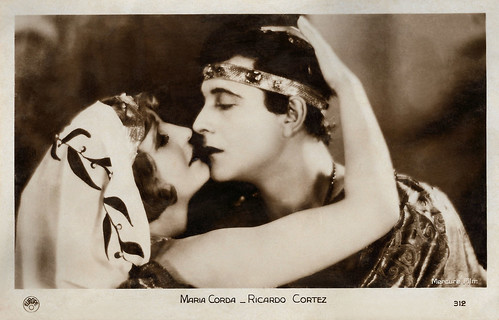
French postcard by Europe, no. 312. Photo: Mercure Film. Maria Corda and Ricardo Cortez in The Private Life of Helen of Troy (Alexander Korda, 1927).
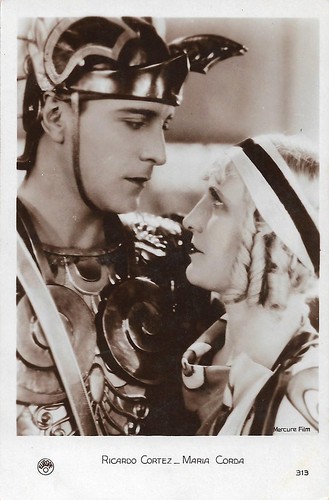
French postcard by Europe, no. 313. Photo: Mercure Film. Maria Corda and Ricardo Cortez in The Private Life of Helen of Troy (Alexander Korda, 1927).

French postcard by Europe, no. 314. Photo: Mercure Film. Ricardo Cortez as Paris in The Private Life of Helen of Troy (Alexander Korda, 1927).
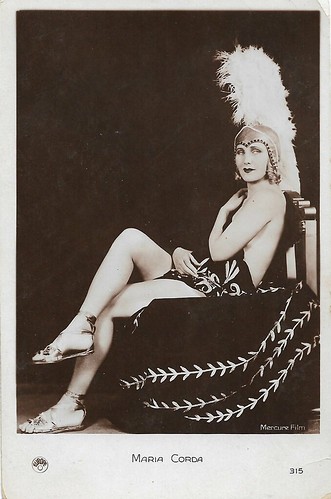
French postcard by Europe, no. 315. Photo: Mercure Film. Maria Corda as Helen of Troy in The Private Life of Helen of Troy (Alexander Korda, 1927).
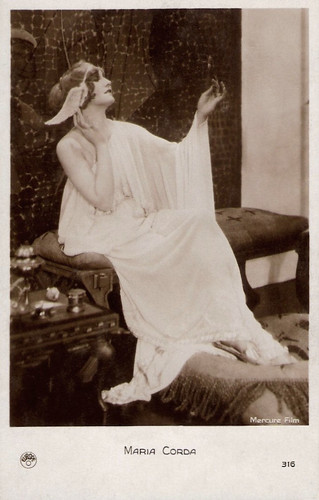
French postcard by Europe, no. 316. Photo: Mercure Film. Maria Corda as Helen of Troy in The Private Life of Helen of Troy (Alexander Korda, 1927).
In the American historical epic The Private Life of Helen of Troy (1927) stars Maria Corda as the legendary Queen Helen of Troy. The film was based on the 1925 novel of the same name by John Erskine and the play 'The Road to Rome' by Robert E. Sherwood, and it was adapted to screen by Carey Wilson with intertitles by Gerald Duffy, Ralph Spence, and Casey Robinson.
In response to her husband Menelaus' (Lewis Stone) lack of interest in her, Helena elopes with Paris (Ricardo Cortez) to Sparta. Menelaus, egged on by his henchman, starts a war with Paris, finally effecting the return of Helen. The time-honoured custom demands that he have the pleasure of killing her, but her seductive loveliness restrains him. And so at the end of the story, we find Helen engaging in a new flirtation with the Prince of Ithaca, while Menelaus happily goes fishing.
The cast also included George Fawcett as Eteoneus, Alice White as Adraste, Bill Elliott as Telemachus and Hungarian actor Károly Huszár, credited here as Charles Puffy, as Malapokitoratoreadetos.
The film was produced by Carey Wilson for Richard A. Rowland Productions and was distributed by First National Pictures. Director George Fitzmaurice started the film, was fired and replaced by Hungarian-born Alexander Korda. The remarkable costumes were designed by Max Rée. Special effects by Ralph Hammaras. The cinematography was done by Lee Garmes and Sid Hickox (Sydney Hickox).
In 1928, the year of the Academy Awards' inception, The Private Life of Helen of Troy was nominated for an Oscar. According to an author at IMDb, it was for 'Engineering Effects', what we call now Special Effects or Special Visual Effects. According to Wikipedia, it was nominated in the short-lived category of 'Best Title Writing'. Wikipedia is right, according to the database at Oscars.org, Gerald Duffy was nominated for WRITING (Title Writing). The category was dropped by the second Academy Awards. Gerald Duffy had died on 25 June 1928, and he was the first person to be posthumously nominated for an Academy Award.
The film was a significant success for Korda. Hal Erickson at AllMovie: "Setting the standard for his later light-hearted biopics The Private Life of Henry VIII and Rembrandt, producer-director Alexander Korda steadfastly refuses to take any of The Private Life of Helen of Troy seriously. Maria Corda, wife of the director, plays the title character as a fetchingly underdressed coquette, oblivious to all the political turmoil she's causing."
Variety: "Helen [based on the novel by John Erskine] is all comedy. Satirizing ancient myth in general and Helen's affairs particularly, the titles are topical, while the music is mainly based on pop dance tunes. Wheeling the giant wooden horse inside the gates of Troy is accomplished to the strains of 'Horses, Horses, Horses', etc."
The Private Life of Helen of Troy survives only partially at the British Film Institute (BFI). Two sections from the beginning and end, running about 27–30 minutes in total, survive there.
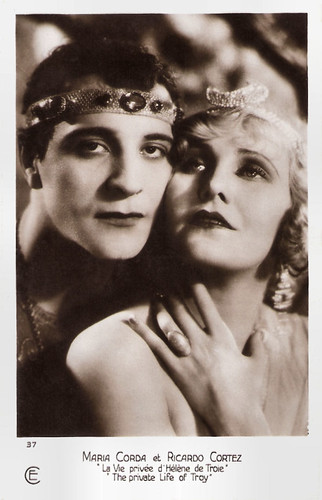
French postcard by Cinémagazine-Edition, no. 37. Photo: publicity still for The Private Life of Helen of Troy (Alexander Korda, 1927).
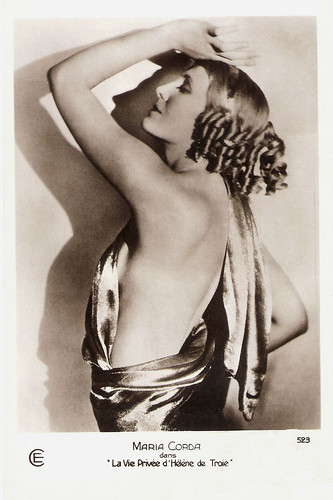
French postcard by Editions Cinémagazine, no. 523. Maria Corda as Helen of Troy in The Private Life of Helen of Troy (Alexander Korda, 1927).

German postcard by Ross Verlag, no. 3216/1, 1928-1929. Photo: Defina / First National. Ricardo Cortez in The Private Life of Helen of Troy (Alexander Korda, 1927).
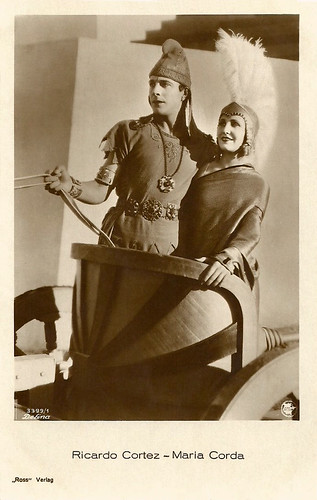
German postcard by Ross Verlag, no. 3399/1. Photo: Defina. Maria Corda and Ricardo Cortez as Helena and Paris in The Private Life of Helen of Troy (Alexander Korda, 1927).
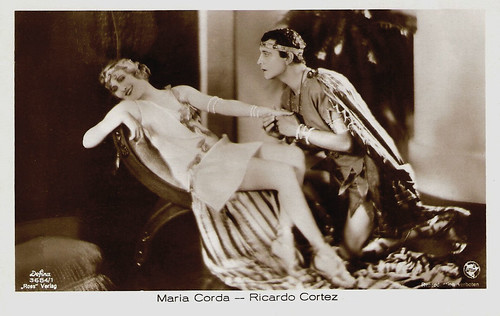
German postcard by Ross Verlag, no. 3684/1, 1928-1929. Photo: Defina. Maria Corda and Ricardo Cortez in The Private Life of Helen of Troy (Alexander Korda, 1927).
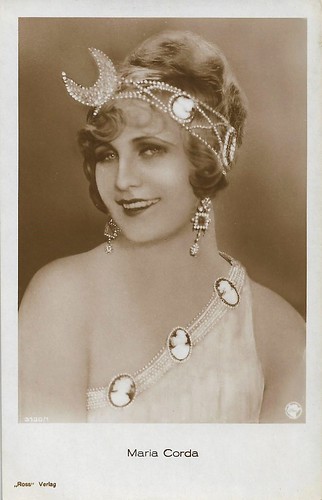
German postcard by Ross Verlag, no. 3780/1, 1928-1929. Photo: First National. Maria Corda in The Private Life of Helen of Troy (Alexander Korda, 1927).
Sources: Hal Erickson (AllMovie), Variety, Silent Era, Oscars.org (now defunct), Wikipedia, and IMDb.
This post was last updated on 19 August 2020.

French postcard by Europe, no. 312. Photo: Mercure Film. Maria Corda and Ricardo Cortez in The Private Life of Helen of Troy (Alexander Korda, 1927).

French postcard by Europe, no. 313. Photo: Mercure Film. Maria Corda and Ricardo Cortez in The Private Life of Helen of Troy (Alexander Korda, 1927).

French postcard by Europe, no. 314. Photo: Mercure Film. Ricardo Cortez as Paris in The Private Life of Helen of Troy (Alexander Korda, 1927).

French postcard by Europe, no. 315. Photo: Mercure Film. Maria Corda as Helen of Troy in The Private Life of Helen of Troy (Alexander Korda, 1927).

French postcard by Europe, no. 316. Photo: Mercure Film. Maria Corda as Helen of Troy in The Private Life of Helen of Troy (Alexander Korda, 1927).
A fetchingly underdressed coquette, oblivious to all the political turmoil she's causing
In the American historical epic The Private Life of Helen of Troy (1927) stars Maria Corda as the legendary Queen Helen of Troy. The film was based on the 1925 novel of the same name by John Erskine and the play 'The Road to Rome' by Robert E. Sherwood, and it was adapted to screen by Carey Wilson with intertitles by Gerald Duffy, Ralph Spence, and Casey Robinson.
In response to her husband Menelaus' (Lewis Stone) lack of interest in her, Helena elopes with Paris (Ricardo Cortez) to Sparta. Menelaus, egged on by his henchman, starts a war with Paris, finally effecting the return of Helen. The time-honoured custom demands that he have the pleasure of killing her, but her seductive loveliness restrains him. And so at the end of the story, we find Helen engaging in a new flirtation with the Prince of Ithaca, while Menelaus happily goes fishing.
The cast also included George Fawcett as Eteoneus, Alice White as Adraste, Bill Elliott as Telemachus and Hungarian actor Károly Huszár, credited here as Charles Puffy, as Malapokitoratoreadetos.
The film was produced by Carey Wilson for Richard A. Rowland Productions and was distributed by First National Pictures. Director George Fitzmaurice started the film, was fired and replaced by Hungarian-born Alexander Korda. The remarkable costumes were designed by Max Rée. Special effects by Ralph Hammaras. The cinematography was done by Lee Garmes and Sid Hickox (Sydney Hickox).
In 1928, the year of the Academy Awards' inception, The Private Life of Helen of Troy was nominated for an Oscar. According to an author at IMDb, it was for 'Engineering Effects', what we call now Special Effects or Special Visual Effects. According to Wikipedia, it was nominated in the short-lived category of 'Best Title Writing'. Wikipedia is right, according to the database at Oscars.org, Gerald Duffy was nominated for WRITING (Title Writing). The category was dropped by the second Academy Awards. Gerald Duffy had died on 25 June 1928, and he was the first person to be posthumously nominated for an Academy Award.
The film was a significant success for Korda. Hal Erickson at AllMovie: "Setting the standard for his later light-hearted biopics The Private Life of Henry VIII and Rembrandt, producer-director Alexander Korda steadfastly refuses to take any of The Private Life of Helen of Troy seriously. Maria Corda, wife of the director, plays the title character as a fetchingly underdressed coquette, oblivious to all the political turmoil she's causing."
Variety: "Helen [based on the novel by John Erskine] is all comedy. Satirizing ancient myth in general and Helen's affairs particularly, the titles are topical, while the music is mainly based on pop dance tunes. Wheeling the giant wooden horse inside the gates of Troy is accomplished to the strains of 'Horses, Horses, Horses', etc."
The Private Life of Helen of Troy survives only partially at the British Film Institute (BFI). Two sections from the beginning and end, running about 27–30 minutes in total, survive there.

French postcard by Cinémagazine-Edition, no. 37. Photo: publicity still for The Private Life of Helen of Troy (Alexander Korda, 1927).

French postcard by Editions Cinémagazine, no. 523. Maria Corda as Helen of Troy in The Private Life of Helen of Troy (Alexander Korda, 1927).

German postcard by Ross Verlag, no. 3216/1, 1928-1929. Photo: Defina / First National. Ricardo Cortez in The Private Life of Helen of Troy (Alexander Korda, 1927).

German postcard by Ross Verlag, no. 3399/1. Photo: Defina. Maria Corda and Ricardo Cortez as Helena and Paris in The Private Life of Helen of Troy (Alexander Korda, 1927).

German postcard by Ross Verlag, no. 3684/1, 1928-1929. Photo: Defina. Maria Corda and Ricardo Cortez in The Private Life of Helen of Troy (Alexander Korda, 1927).

German postcard by Ross Verlag, no. 3780/1, 1928-1929. Photo: First National. Maria Corda in The Private Life of Helen of Troy (Alexander Korda, 1927).
Sources: Hal Erickson (AllMovie), Variety, Silent Era, Oscars.org (now defunct), Wikipedia, and IMDb.
This post was last updated on 19 August 2020.
No comments:
Post a Comment